最新非谓语动词做宾语讲解及练习
- 格式:doc
- 大小:40.50 KB
- 文档页数:10
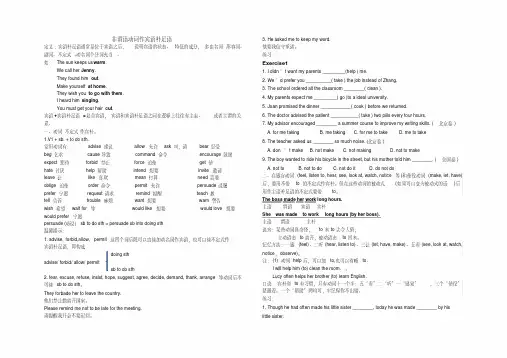
非谓语动词作宾语补足语定义:宾语补足语通常是位于宾语之后,说明宾语的状态、特征的成分,多由名词,形容词、副词、不定式,动名词个分词充当.如:The sun keeps us warm.We call her Jenny.They found him out.Make yourself at home.They wish you to go with them.I heard him singing.You must get your hair cut.宾语+宾语补足语=复合宾语,宾语和宾语补足语之间在逻辑上往往有主表、或者主谓的关系.一、动词不定式作宾补。
1.V1 + sb. + to do sth.常用动词有:advise 建议allow 允许ask 叫,请bear 忍受beg 乞求cause 导致command 命令encourage 鼓励expect 期待forbid 禁止force 迫使get 使hate 讨厌help 帮助intend 想要invite 邀请leave 让like 喜欢mean 打算need 需要oblige 迫使order 命令permit 允许persuade 说服prefer 宁愿request 请求remind 提醒teach 教tell 告诉trouble 麻烦want 想要warn 警告wish 希望wait for 等would like 想要would love 想要would prefer 宁愿persuade (劝说)sb to do sth = persuade sb into doing sth温馨提示:1.advise, forbid,allow, permit 这四个词后既可以直接加动名词作宾语,也可以接不定式作宾语补足语,即构成doing sthadvise/ forbid/ allow/ permitsb to do sth2.fear, excuse, refuse, insist, hope, suggest, agree, decide, demand, thank, arrange 等动词后不可接sb to do sth。



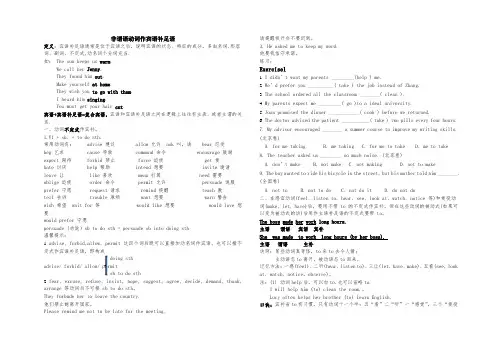
非谓语动词作宾语补足语定义:宾语补足语通常是位于宾语之后,说明宾语的状态、特征的成分,多由名词,形容词、副词、不定式,动名词个分词充当.如: The sun keeps us warm.We call her Jenny.They found him out.Make yourself at home.They wish you to go with them.I heard him singing.You must get your hair cut.宾语+宾语补足语=复合宾语,宾语和宾语补足语之间在逻辑上往往有主表、或者主谓的关系.一、动词不定式作宾补。
1.V1 + sb. + to do sth.常用动词有: advise 建议 allow 允许 ask 叫,请 bear 忍受beg 乞求 cause 导致 command 命令 encourage 鼓励expect 期待 forbid 禁止 force 迫使 get 使hate 讨厌 help 帮助 intend 想要 invite 邀请leave 让 like 喜欢 mean 打算 need 需要oblige 迫使 order 命令 permit 允许 persuade 说服prefer 宁愿 request 请求 remind 提醒 teach 教tell 告诉 trouble 麻烦 want 想要 warn 警告wish 希望 wait for 等 would like 想要 would love 想要would prefer 宁愿persuade (劝说)sb to do sth = persuade sb into doing sth温馨提示:1.advise, forbid,allow, permit 这四个词后既可以直接加动名词作宾语,也可以接不定式作宾语补足语,即构成doing sthsb to do sth2.fear, excuse, refuse, insist, hope, suggest, agree, decide, demand, thank, arrange 等动词后不可接 sb to do sth。

非谓语动词作宾语讲解非谓语动词是指在句子中充当宾语的动词的非谓语形式,包括动词不定式、动名词和分词。
非谓语动词作宾语常见于复合句中,可以起到丰富句子结构、增强语义、简化句子等作用。
本文将详细讲解非谓语动词作宾语的用法和注意事项。
一、动词不定式作宾语动词不定式作宾语时,常用形式为“动词不定式+to”,其中to可以省略。
一般来说,动词不定式作宾语时,在意义上相当于一个名词,可以表示目的、结果、愿望、能力等。
例句:1. I want to learn how to play the guitar.(我想学会弹吉他)2. She decided not to go abroad for further study.(她决定不出国深造)除了直接作宾语外,动词不定式还可以作及物动词的宾语补足语,说明宾语具备的特点、状态或能力。
例句:1. They find it difficult to solve the math problem.(他们发现解这个数学问题很困难)2. I consider him to be a reliable friend.(我认为他是一个可靠的朋友)二、动名词作宾语动名词作宾语时,常形式为“动名词+ing”。
动名词作宾语可以表示动作或状态,常用于感官动词(see, hear, feel等)和使役动词(make, let, have等)后面。
例句:1. I enjoy swimming in the sea.(我喜欢在海里游泳)2. My mother made me clean my room.(我妈妈让我打扫房间)动名词作宾语还可以表示习惯、爱好等。
例句:1. She gave up smoking last year.(她去年戒烟了)2. He hates doing housework.(他讨厌做家务)三、分词作宾语分词作宾语时,常用现在分词或过去分词形式。
分词作宾语可以表示被动、完成或正在进行等含义。
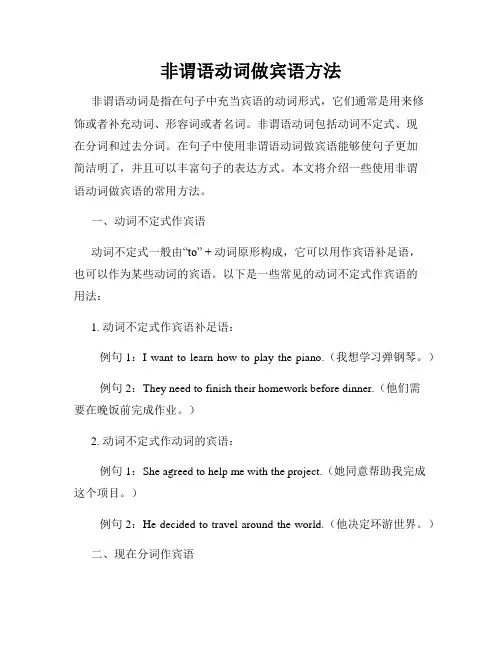
非谓语动词做宾语方法非谓语动词是指在句子中充当宾语的动词形式,它们通常是用来修饰或者补充动词、形容词或者名词。
非谓语动词包括动词不定式、现在分词和过去分词。
在句子中使用非谓语动词做宾语能够使句子更加简洁明了,并且可以丰富句子的表达方式。
本文将介绍一些使用非谓语动词做宾语的常用方法。
一、动词不定式作宾语动词不定式一般由“to” + 动词原形构成,它可以用作宾语补足语,也可以作为某些动词的宾语。
以下是一些常见的动词不定式作宾语的用法:1. 动词不定式作宾语补足语:例句1:I want to learn how to play the piano.(我想学习弹钢琴。
)例句2:They need to finish their homework before dinner.(他们需要在晚饭前完成作业。
)2. 动词不定式作动词的宾语:例句1:She agreed to help me with the project.(她同意帮助我完成这个项目。
)例句2:He decided to travel around the world.(他决定环游世界。
)二、现在分词作宾语现在分词是以“ing”结尾的动词形式,它可以作为某些动词的宾语。
以下是一些常见的现在分词作宾语的用法:1. 现在分词作动词的宾语:例句1:They enjoy swimming in the pool.(他们喜欢在泳池里游泳。
)例句2:She hates running in the rain.(她讨厌在雨中跑步。
)2. 现在分词作形容词的宾语:例句1:I find this movie boring.(我觉得这部电影很无聊。
)例句2:He found the book fascinating.(他觉得这本书很迷人。
)三、过去分词作宾语过去分词是动词的一种形式,它通常以“ed”或者“en”结尾,在句子中可以作为某些动词的宾语。
以下是一些常见的过去分词作宾语的用法:1. 过去分词作动词的宾语:例句1:They have watched the movie many times.(他们已经看了这部电影很多次。
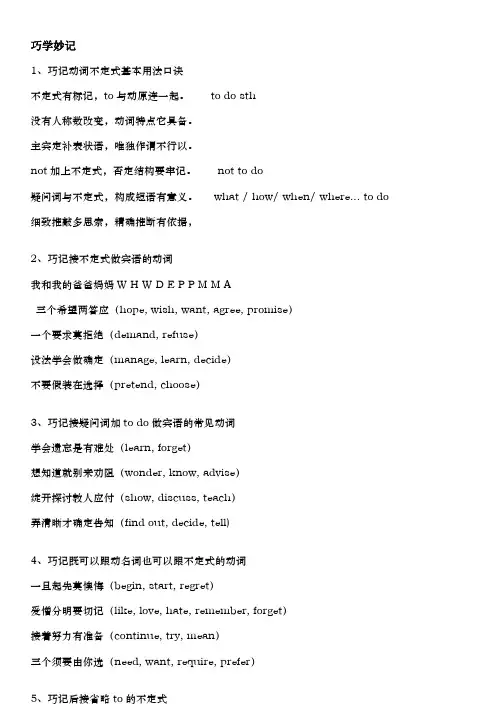
巧学妙记1、巧记动词不定式基本用法口诀不定式有标记,to与动原连一起。
to do sth没有人称数改变,动词特点它具备。
主宾定补表状语,唯独作谓不行以。
not加上不定式,否定结构要牢记。
not to do疑问词与不定式,构成短语有意义。
what / how/ when/ where... to do 细致推敲多思索,精确推断有依据,2、巧记接不定式做宾语的动词我和我的爸爸妈妈W H W D E P P M M A三个希望两答应(hope, wish, want, agree, promise)一个要求莫拒绝(demand, refuse)设法学会做确定(manage, learn, decide)不要假装在选择(pretend, choose)3、巧记接疑问词加to do做宾语的常见动词学会遗忘是有难处(learn, forget)想知道就别来劝阻(wonder, know, advise)绽开探讨教人应付(show, discuss, teach)弄清晰才确定告知(find out, decide, tell)4、巧记既可以跟动名词也可以跟不定式的动词一旦起先莫懊悔(begin, start, regret)爱憎分明要切记(like, love, hate, remember, forget)接着努力有准备(continue, try, mean)三个须要由你选(need, want, require, prefer)5、巧记后接省略to的不定式五看(see, watch, look at, notice)二听(listen to, hear)一感(feel)三让(let, make, have)一个help两均可6、巧记少数后面只能用动名词做宾语的动词喜爱考虑不行免(enjoy, consider, escape, avoid)停止放弃太冒险(stop, give up, risk)介意想象莫推延(mind, imagine, delay, put off)要求完成是期望(require, finish, look forward to)建议接着勤练习(suggest, go on, practise)不禁宽恕要坚持(can't help, excuse, insist on)接着留意使胜利(keep on, mind, succeed in)非谓语动词作宾语1.I don't allow _____ in my drawing room. I don't allow my family _____ at all.A. smoking;to smokeB. to smoke;smokingC. to smoke;to smokeD. smoking;smoking2.Your clothes need _____.A. washedB. to be washedC. to washD. being washing3.This bike is not worthy _____.A. to be repairedB. of repairingC. to repairD. repairing4._____ provides us with essential nutrients, while _____ provides us with oxygen.A. To eat;breathingB. Eating;to breatheC. Eating;breathingD. Eaten;breathed5.Rebecca was unhappy for _____ the first chance to go abroad.A. not having been givenB. not having givenC. not givingD. having been given6._____ is better to love than _____.A. That;to be lovedB. That;be loveC. It;be lovedD. It;to be loved7.I've got the loaf;now I'm looking for a bread knife _____.A. cutting it byB. cutting it withC. to cut it withD. to cut it by8.I'm glad _____ by him yesterday.A. not be seenB. to not have been seenC. not to have been seenD. not to have seen9.-What do you think about English?-It's a difficult language _____.A. speakingB. to be spokenC. to speakD. spoken10.He would rather stay at home than _____ out with you.A. goB. to goC. goingD. goes11.I'm considering _____ your offer.A. to have acceptedB. being acceptedC. acceptingD. to accept12.-What's made Ruth so upset?-_____ three tickets to the folk music concert.A. LostB. LosingC. Because of losingD. Since she lost13.Before _____ to the college, he had to go through an examination.A. admittingB. to admitC. being admittedD. having been admitting14.She pretended _____ me when I passed by.A. not to seeB. not seeingC. to not seeD. having not seen15.The story was so funny that we _____.A. couldn't help laughB. can't but laughC. couldn't help laughingD. couldn't help but to laugh 16.Don't forget _____ this book to John when you see him.A. to returnB. returningC. returnD. to returning17.-It's getting very late. Maybe we shouldn't go.- No, let's go. Getting there late is better than _____ at all.A. we don't arriveB. to arrive notC. not to arriveD. not arriving18.Only one of these books is _____.A. worth to readB. worth being readC. worth of readingD. worth reading19.We are both looking forward to _____ next week.A. going on vacationB. go on vacationC. be going on vacationD. have gone on vacation 20.Remember _____ the newspaper when you have finished it.A. putting backB. having put backC. to put backD. will put back21.He had no difficulty _____ the problems.A. working outB. having worked outC. to have worked outD. to work out22.The sentence wants _____ once more.A. to explainB. explainingC. being explainedD. to be explained it23.Articles used by patients must be disinfected before _____ others.A. usingB. being used byC. used byD. being using24.I regretted _____ that to her.A. having saidB. to have saidC. to sayD. /25.Our monitor suggested _____ a discussion of the subject.A. to haveB. should haveC. haveD. having26.I can't understand _____ at her.A. you laughB. you to laughC. why laughD. your laughing27.In order to reach the top of the hill in six hours, they try _____.A. to climb the mountain hardlyB. hard to climb the mountainC. to climb hardly the mountainD. to climb the mountain hard 28.I happened _____ the article when he asked me about it.A. having readB. to have readC. to be readD. reading29.He is said _____ to London already.A. having sentB. to be sendingC. to have been sentD. being sent30.The little boy insisted on _____ with a cake.A. being servedB. to be servedC. servingD. serve31.Mr. Crossett seemed _____ the visitor somewhere before.A. meetingB. to have metC. to be meetingD. to meet32.He asked who was the man _____ on.A. to be operatingB. operatingC. to operateD. being operated33.I apologize for _____ my promise.A. not having keptB. being keptC. not to have keptD. having not kept34.He doesn't like _____ in public.A. praisingB. to be praisedC. to praiseD. praised35.The doctor was careful _____ the patient the truth.A. not having toldB. not to tellC. to not tellD. not telling36.Will you _____ me _____ out this problem myself?A. forbid;to workB. allow;workC. let;workD. permit;working37.-What do you think of this school?-It is a very good _____.A. studying schoolB. school for children to studyC. school to study inD. school to study38.He loves parties. He is always the first _____ and the last _____.A. of coming;of leavingB. comes;leavesC. to come;to leaveD. coming;leaving39.Before liberation he had no chance _____.A. of going to the schoolB. to go to schoolC. to go to the schoolD. going to school 40.You'd better _____ her the bad news now.A. don't tellB. not tellC. won't tellD. not to tell1. I like __________ very much, but I don’t like _________ this morning.A. swimming, swimmingB. to swim, to swimC. swimming, to swimD. to swim, swimming2. Little Jim should love __________ to the theatre this evening.A. to be takenB. to takeC. being takenD. taking3. Remember __________ the newspaperr when you have finished it.A. putting backB. having put backC. to put backD. will put back4. Henry always forgets things he has done. Yesterday he forgot __________ and looked for iteverywhere.A. to post the letterB. to have the letter postedC. to have posted the letterD. having posted the letter5. My brother regretted __________ a lecture given by Professor Liu.A. missingB. to missC. missedD. being missed6. I regret __________ you that we are unable to offer you a job.A. informingB. having informedC. to informD.to informing7. I felt tired with walking, so I stopped __________ a break for an hour.A. havingB. to haveC. takingD. to taking8. ---“What can we do to help Li Hai.”---“All we can do is to try __________ that he ought to study more.”A. making him to realizeB. making him realizeC. to make him realizeD. to make him to realize9. The grass has grown so tall that it needs _________.A. to cutB. to be cut itC. cuttingD. being cut10. You didn’t need __________ him the news; it just made him sad.A. tellingB. tellC. to tellD. that you would tell11. These young trees require __________ carefully.A. looking afterB. to look afterC. to be looked atD. looking for12. The sentence wants __________ once more.A.to explainB. explainingC. being explainedD.to be explained it13. He hasn’t got used __________ in the countryside yet.A. liveB. to liveC. to livingD. living14. A very well-known person __________ in this house.A. is used to liveB. used to liveC. is used to livingD. used to living15. The clock was beginning __________ twelve and everybody held their breath.A. strikeB. to strikeC. strikingD. struck16. I begin __________ the meaning, which begins __________.A. understanding, to be clearB. to understand, to be clearC. understanding, being clearD. to understand, being clear17. The police forbid __________ here.A. parkB. parkingC. to parkD. to be parked18. The heavy rain forbade me __________ to school.A. from my comingB. to comeC. comeD. my coming19. Tom’s parents do not allow Tom __________ swimming.A. goingB. to goC. goD. goes20. Sorry, we don’t allow __________ in the lecture room.A. to smokeB. smokeC. smokingD. to smoking21. Visitors are not permitted __________ the park after dark, because of the lack of lighting.A. to enterB. enteringC. to enter inD. entering in22. They don’t permit __________ noise her.A. to makeB. makeC. makingD. made23. Missing the train means __________ for an hour.A. to waitB. to be waitedC. being waitedD. waiting24. I meant __________ you, but I was so busy.A. to call onB. calling onC. to call atD. calling at25. I would appreciate __________ back this afternoon.A. you to callB. you callC. your callingD.you’re calling26. She enjoys __________ light music.A. to hearB. hearingC. listening toD. to listen to27. You can keep the book until you __________.A. have finished readingB. finish to readC. will finish readingD. have finished to read28. Ali said that she wouldn’t mind _________ alone at home.A. leftB. being leftC. to be leftD. leaving29. If you keep __________ English, you can learn English well.A. practising speakB. practising speakingC. practising to speakD. to practise spoken30. Our monitor suggested __________ a discussion of the subject.A. to haveB. should haveC. haveD. having31. We are considering _________ a new plan.A. makingB. being madeC. to makeD. to have made32. The squirrel was lucky that it just missed __________.A. catchingB. to be caughtC. being caughtD. to catch33. Can you imagine yourself __________ on a desert island?A. stayingB. stayC. have stayedD. being stayed34. We can understand why he avoids __________ to us.A. to speakB. speechC. having spokenD. speaking35. Please excuse my _________ in without _________.A. come, askingB. coming, askingC. to come, being askedD. coming, being asked36. Why have they delayed __________ the new school?A. openingB. to openC. having openedD. to have opened37. She __________ the key.A. admited takingB. admitted takingC. admitted having takenD. admitted to have taken38. I got to the station earlier than others. I couldn’t risk ___________ the train.A. missingB. would missC. to missD. missed39. I hope __________ him as soon as possible.A. seeB. seeingC. to seeD. to have seen40. I expected __________ your friend, but my car broke down on the way.A. I’ll meetB. meetingC. to meetingD. to meet41. We are planning __________ Europe this summer.A. to pay a visitB. pay a visit toC. visitingD. to visit42. She told me that she had decided __________ again.A. be not lateB. not be lateC. not to be lateD. to be not late43. Almost everyone fails __________ on the first try.A. in passing his driver’s testB. to pass his driver’s testC. to have passed his driver’s testD. passing his driver’s test44. The two weavers pretended __________ very hard, though they did nothing at the looms.A. workB. workingC. to be workD. to be working45. When he got off the train, it happened __________.A. to rainB. to be rainingC. rainingD. to raining。
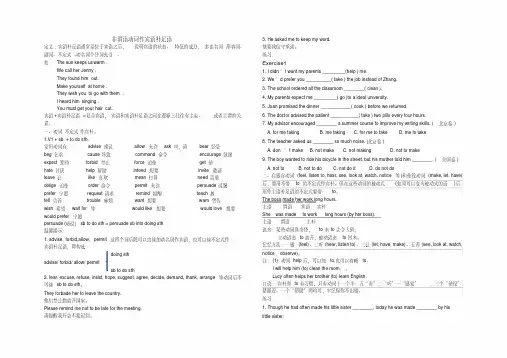
非谓语动词作宾语补足语定义:宾语补足语通常是位于宾语之后,说明宾语的状态、特征的成分,多由名词,形容词、副词、不定式,动名词个分词充当.如:The sun keeps us warm.We call her Jenny.They found him out.Make yourself at home.They wish you to go with them.I heard him singing.You must get your hair cut.宾语+宾语补足语=复合宾语,宾语和宾语补足语之间在逻辑上往往有主表、或者主谓的关系.一、动词不定式作宾补。
1.V1 + sb. + to do sth.常用动词有:advise 建议allow 允许ask 叫,请bear 忍受beg 乞求cause 导致command 命令encourage 鼓励expect 期待forbid 禁止force 迫使get 使hate 讨厌help 帮助intend 想要invite 邀请leave 让like 喜欢mean 打算need 需要oblige 迫使order 命令permit 允许persuade 说服prefer 宁愿request 请求remind 提醒teach 教tell 告诉trouble 麻烦want 想要warn 警告wish 希望wait for 等would like 想要would love 想要would prefer 宁愿persuade (劝说)sb to do sth = persuade sb into doing sth温馨提示:1.advise, forbid,allow, permit 这四个词后既可以直接加动名词作宾语,也可以接不定式作宾语补足语,即构成doing sthadvise/ forbid/ allow/ permitsb to do sth2.fear, excuse, refuse, insist, hope, suggest, agree, decide, demand, thank, arrange 等动词后不可接sb to do sth。

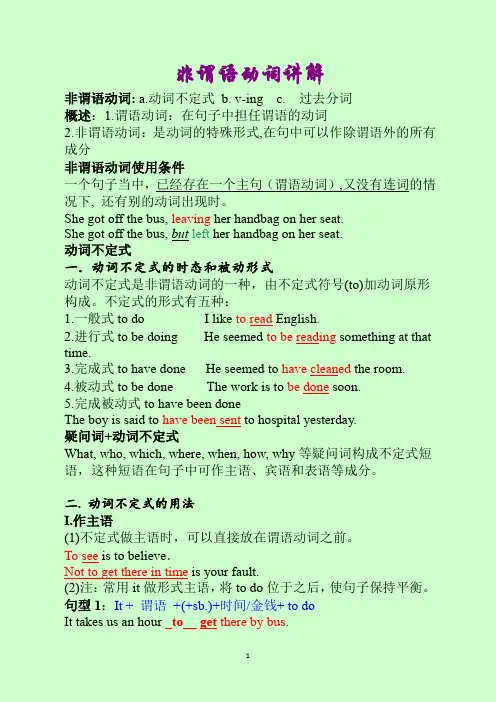
非谓语动词讲解非谓语动词: a.动词不定式 b. v-ing c. 过去分词概述:1.谓语动词:在句子中担任谓语的动词2.非谓语动词:是动词的特殊形式,在句中可以作除谓语外的所有成分非谓语动词使用条件一个句子当中,已经存在一个主句(谓语动词),又没有连词的情况下, 还有别的动词出现时。
She got off the bus, leaving her handbag on her seat.She got off the bus, but left her handbag on her seat.动词不定式一.动词不定式的时态和被动形式动词不定式是非谓语动词的一种,由不定式符号(to)加动词原形构成。
不定式的形式有五种:1.一般式to do I like to read English.2.进行式to be doing He seemed to be reading something at that time.3.完成式to have done He seemed to have cleaned the room.4.被动式to be done The work is to be done soon.5.完成被动式to have been doneThe boy is said to have been sent to hospital yesterday.疑问词+动词不定式What, who, which, where, when, how, why等疑问词构成不定式短语,这种短语在句子中可作主语、宾语和表语等成分。
二. 动词不定式的用法I.作主语(1)不定式做主语时,可以直接放在谓语动词之前。
To see is to believe.Not to get there in time is your fault.(2)注:常用it做形式主语,将to do位于之后,使句子保持平衡。
句型1:It + 谓语+(+sb.)+时间/金钱+ to doIt takes us an hour _to__ get there by bus.It costs you only $ 100 a month to cook at home.It seemed impossible to save money.句型2:It’s + n. (+ for sb) + to doIt’s our duty _to_ help the poor.It is a great enjoyment _to_ spend our holiday in the countryside..It is a great honor for us to be present at your birthday party.句型3:It is + adj (+ for sb)to do sth(是形容事物的性质的)It is + adj (+ of sb)to do sth(是形容人的品质的)It is easy for me to finish this work before ten.It is very kind of you to give me some help.It's impolite of you to speak to the teacher like that.疑问词+不定式作主语When to start remains undecided.1.It is easy to get there by bus or taxi.2. It takes about 3 hours to see all the birds.3. It is also impolite to speak with your mouth full when you are eating.4. It’s our duty to take good care of the old.5. How long did it take you to finish the work?6. It is stupid of you to write down everything the teacher says.7. When to start has not been decided.8. It seemed selfish of him not to give them anything.9. It’s necessary for you to lock the car when you do not use it.10. It is useful for our health to do morning exercises.II.作宾语接不定式做宾语I want to know this matter.I don’t expect to meet you here(1)常见动词有:like, demand, expect, promise, begin, determine, refuse, fail, manage, learn, seem, forget, want, prepare, pretend, plan, wish等They want to get_( get ) on the bus, didn’t they?He said he wished __to be ( be ) a professor.(2)it作形式宾语I find/feel to work with him interesting .I find/feel it interesting to work with him.Subject+ find/think/feel/make/ consider… it+adj/n + to do sth.1.We thought_it__better__to_start early.2.Do you consider_it__better not_to_go?3.I feel_it_my duty_to_change all that.4.We think it __ important _ to _ obey the law.5.I know _ it _ impossible _ to _ finish so much homework in a day. (3)疑问词+不定式作宾语常常放在这些动词的后面作宾语:tell, advise, show, teach, find out, decide, discuss, learn, explain…He taught us how to use the tool.No one could tell me where to get the book.The dictionary didn’t tell the Frenchman how to pronounce the word.(4) 作介词but, except, besides的宾语。
非谓语动词作宾语的讲解和练习定义:在句子中充当除谓语以外的各种句子成分的动词形式,叫做非谓语动词(the Non-Finite Verbs)。
非谓语动词也是动词的一种,他们有着动词的其他特点,可以充当主语、宾语、状语等。
非谓语动词与谓语动词是相对的概念。
主要包括不定式、动名词和分词(现在分词和过去分词),即动词的非谓语形式。
一.动名词做宾语的口诀 : 即动词+v.ing考虑建议盼原谅,承认推迟没得想避免错过继续练,否认完成就欣赏禁止想象才冒险,不禁介意准逃亡难以忍受始反对,想要成功坚持忙习惯放弃有困难,导致专心防道歉。
解析:(记住口诀中对应的动词,)第一句包含的动词有:consider, suggest/advise, look forward to, excuse/pardon,第二节包含的动词有:admit, delay/put off, fancy(想像,想要),第三句包含的动词有:avoid, miss, keep/keep on, practice,第四句句包含的动词有:deny(否认,拒绝), finish, enjoy/appreciate(欣赏),第五句包含的动词有:forbid, imagine, risk(冒险)第六句包含的动词有:can't help, mind, allow/permit, escape.第七句包含的动词有:can't stand(难以忍受),set about 开始,着手,object to(反对),第八句包含动词有:feel like(想要),succeed in (成功),stick to(坚持) ,insist on(坚持,强调,坚决要求),be busy (in)(忙于做某事)第九句包含的动词有:be used/accustomed to(习惯于…),give up(放弃), have difficulty/trouble (in), (做某事有困难)第十句包含的动词有:lead to(导致), devote to(将…奉献给;把…专用于),prevent…… from……(预防,防止),apologize for(为……道歉),此外,have a good/wonderful/hard time (in), spend time (in),thank you for, pay attention to, aim at 目的在于,旨在;瞄准;企图,accuse…of… 控告;谴责,get down to(开始认真处理,对待), etc.二、通常只能接不定式作宾语的动词:(即:动词+to do) 记忆口诀如下:同意提出做计划,要求答应来帮忙。
高考英语之非谓语动词作宾语一、在一般句子中, 谓语后或非谓语后的词称为宾语, 其放在动词或介词的后面。
下面为大家讲解下非谓语to do 和doing作宾语。
二、to do 作宾语、常见to do 作宾语, 表一次性、无意识动作和将要。
但实际上, 常将此种用法, 看作是某些动词后接to do 的固定用法。
例如:1、.lik.t.ea.ou.tonight.我想今晚外出吃饭。
(一次性动作)2、H.mean.t.figh.wit.you.他打算和你一起作战。
(一次性动作)Th.gir.forgo.t.tur.of.th.ligh.whe.leaving.3、离开时, 那个女孩忘记关灯了。
(将要)4、We prefer to stay at home。
我宁愿待在家。
(将要)H.refuse.t.hel.hi.friend.i.need.他拒绝帮需要他的朋友。
(无意识)I.start.t.rai.soon.开始下雨了。
(无意识)高考常见to do 做宾语的动词:want 想要decide/determine 决定learn 学会plan 计划pretend 假装wish/hope 希望help 帮助ask 要求expect/long 期望manage 成功做到intend/tend 打算refuse/decline 拒绝dare 敢need 需要agree 同意mean 打算offer 提供arrange 安排promise 答应afford 承担得起prepare 准备attempt 企图aim 旨在beg祈求desire 渴望fear 恐惧care 关心hesitate 犹豫swear 发誓threaten 威胁claim 声称, 主张trouble 麻烦(二)、it 作形式宾语, to do 作真正的宾语。
常用动词为:consider/think/find 认为, believe 相信, feel感觉(+其他感官动词类), make使, 让(+其他使役动词类)等。
动词的ing形式作表语,定语,宾补和状语一、动词-ing形式作表语1. 表示主语的内容,可以转换到句首作主语Her job is keeping the lecture hall as clean as possible. (= keeping the lecture hall as clean as possible is her job)她的工作是尽量使报告厅保持干净。
2. 表示主语具有的特征、性质和状态(动词ing 相当一个形容词)The problem is quite puzzling.这个问题很令困惑。
3.常用来作表语的现在分词有astonishing, amusing, confusing, disappointing, boring, encouraging, inspiring, moving, tiring, interesting, surprising等。
全析提示:动词-ing形式作表语时,其逻辑主语往往是句子中的主语,但用作表语的-ing形式也可带有自己的逻辑主语。
What worries me most is her staying too late every night. (staying too late every night的逻辑主语是her)二、动词-ing形式作定语1 单个的动词-ing形式可以作前置定语,一般具有两种含义。
①说明被修饰名词的用途和性能。
a reading room = a room which is used for reading 阅览室running shoes =shoes for running 跑鞋a working method =a method for working 工作方法②表示所修饰的人或物的动作或状态,在意思上接近一个定语从句,可以表示正在进行的动作,也可表示经常性动作或当时的状态。
developing countries = countries that are developing发展中国家an ordinary-looking house = a house that looks ordinary看起来很普通的房子a puzzling problem = a problem that puzzles somebody困扰人的问题2 作定语的动词-ing形式如是一个短语,则应放在被修饰词的后面,做后置定语,相当于一个定语从句。
【英语】非谓语动词解说及练习(含答案)一、单项选择非谓语动词1.The film star wears sunglasses. Therefore, he can go shopping without ___________. A.recognizing B.being recognizedC. having recognized D. having been recognized【答案】 B【分析】试题剖析:本题考察动词的非谓语动词形式。
句意:那位电影明星戴上墨镜。
所以,他去买东西不会被认出来。
依据题中的介词without判断,今后应当使用动词的动名词形式,因为他是被人认出的,所以应当用动名词的被动式,所以选B。
考点:考察非谓语动词的用法2.(天津 ) The hospital has recently obtained new medical equipment, ________ more patients to be treated.A. being allowed B.allowingC. having allowed D. allowed【答案】 B【分析】【详解】考察非谓语动词。
句意:近期这个医院购进了新的医疗设施,同意更多的病人被治疗。
前句购进医疗设施和后边同意更多的病人被治疗之间是必定的结果关系,用doing 即此刻分词作结果状语,表示理所应当的结果。
A. being allowed 表示被动且正在进行; C. having allowed 重申先于谓语动词发生; D. allowed 表示被动且达成,应选B。
【点睛】判断非谓语动词的形式的第一步是剖析句子成分,看是用谓语动词仍是非谓语动词,确立了是非谓语动词,还要判断非谓语动词的成分,和这个动词和逻辑主语的关系。
3.________ by the advances in technology, many farmers have set up wind farms on their land. A. Being encouraged B.EncouragingC. Encouraged D. Having encouraged【答案】 C【分析】试题剖析:考察过去分词做状语:句意:被科技的进步激励着,好多农民在自己的土地上建起了风力发电厂。
非谓语动词讲解以及例句非谓语动词是指动词的非谓语形式,不受主语的人称和数的限制,常用作句子的宾语、定语或状语。
非谓语动词包括动名词、不定式和分词三种形式。
一、动名词(-ing形式):1. 作主语:Being kind to others is always a good thing to do.(对他人友善总是值得做的好事。
)2. 作宾语:I enjoy swimming in the ocean.(我喜欢在海里游泳。
)3. 作宾补:She made a decision, ending their relationship.(她做出了一个决定,结束了他们的关系。
)4. 作定语:The running water is so clear and refreshing.(流动的水非常清澈和令人神清气爽。
)5. 作状语:Knowing the answer, he raised his hand.(知道答案后,他举手了。
)二、不定式(to + 动词原形):1. 作主语:To learn a new language is challenging but rewarding.(学习一门新语言是具有挑战性但值得的。
)2. 作宾语:She wants to visit Paris next year.(她想明年去巴黎旅游。
)3. 作宾补:I need to finish this report by tomorrow.(我需要明天之前完成这份报告。
)4. 作定语:He is the best person to ask for help.(他是寻求帮助的最佳人选。
)5. 作状语:She went to the library to study.(她去图书馆学习。
)三、分词:1. 现在分词(-ing形式):The crying baby woke up the entire neighborhood.(哭闹的婴儿吵醒了整个社区。
非谓语动词之五兆芳芳创作非谓语动词(一)——动词不定式动词不定式、分词(现在分词,过来分词)和动名词统称为非谓语动词.现代英语将现在分词和动名词合为一大类叫作v + ing形式.这些动词的形式不克不及在句中单独作谓语用,因而没有语法主语.但可以有逻辑主语.由于没有语法主语,也就不受人称和数的限定,因为不是谓语,也就没有时态和语态,但这些词仍能暗示动作和状态,所以仍有暗示与其他动词相对时间关系的形式.由于与其它词有逻辑上的主谓关系,因此也有暗示主、主动的形式,同时也有自己的宾语和状语,一起组成非谓语动词的短语(动词不定式短语,分词短语,动名词短语).动词不定式、过来分词及v-ing形式在句中均不克不及作谓语用,所以叫做非谓语动词.(一)动词不定式:动词不定式由“to+ 动词原形”组成,如:to study, to play,动词不定式虽然不克不及作谓语动词用,但仍留着动词的特征,它可以带有所需要的宾语或状语而组成动词不定式短语,如:to study hard, to play table tennis.1、动词不定式的形式变更:动词不定式有下列时态和语态的形式变更.2、动词不定式的根本用法:动词不定式能起名词、形容词和副词的作用,可在句中作主语、表语、宾语补足语、定语和状语用,如:(1)作主语:To help each other is good.(动词不定式作主语时,一般可用it作形式主语,而将作主语的动词不定式置于句末,如:It is good to help each other.(2)作表语:My job is to drive them to the power station every day. 动词不定式在系动词be之后作表语,与暗示未来时的be + 动词不定式结构有所区别,如:Our plan is to set up another middle school for the peasants’ children.我们的筹划是给农民子弟再成立一所中学.(句中的谓语动词为is,动词不定式to set up… 为表语,主语为plan,但plan其实不是动词不定式的逻辑主语,即动词不定式to set up所暗示的动作不是主语plan产生的.)We are to set up another middle school for the peasants’ children.我们将为农民的子弟再成立一所中学.(句中的are to set up整个结构为句中谓语,主语为we,同时也是动词不定式to set up所暗示的动作的逻辑主语,即动词不定式to set up所暗示的动作是由we产生的).(3)作宾语:①作及物动词的宾语,如:She wishes to be a musician.;②作某些形容词的宾语:可以有动词不定式为宾语的形容词一般有glad, sorry, afraid, pleased, determined, willing, eager, anxious, ready, sure等,如:I am determined to give up smoking.;③动词不定式一般不作介词的宾语,但动词不定式之前如有疑问词时,就可作介词的宾语,如:Can you give us some advice on what to do next?(4)作宾语补足语,如:Tell the children not to play on the street. 如果句中的谓语动词为see, hear, watch, notice, have, make, let等,作宾语补足语的动词不定式须将to省去,如:I saw a little girl run across the street.(5)动词不定式在句中作宾语,如带有宾语补足语时,须先用it 作形式宾语,而将该动词不定式后置,如:I don’t think i t right to do it that way.(6)作定语:动词不定式作定语时,须位于被其修饰的名词或代词之后,如:Is this the best way to help him? 和定语用的动词不定式如果是不及物动词,不定式前面就要用需要的介词,如:He is the man to depend on. 如果被不定式修饰的名词为place, time, way,不定式前面的介词,习惯上可以省去,如:The old man is looking for a quiet place to live.(7)作状语:动词不定式可以作下列的状语:①目的状语:Every morning he gets up very early to read English. 为了强调不定式暗示目的的作用,可在不定式前加in order to或so as to(以便或为了),但应注意in order to位于句首或句中均可,而so as to不克不及位于句首,如:She reads China Daily every day in order to (so as to) improve her English. 将暗示目的的不定式置于句首,也可强调目的的作用,如:To master a foreign language, one must work hard at it. ②结果状语:They lived to see the liberation of their home town.他们活到亲眼见到了他们故乡的解放.③too + 形容词或副词+ 动词不定式,暗示“足能…”的结果,如:You are old enough to take care of yourself now.3、复合结构不定式:由for + 名词(或代词宾格)+ 动词不定式即组成复合结构的动词不定式.其中for自己无意义.for前面的名词或代词是不定式的逻辑主语,这种不定式在句中可作主语、表语、宾语、定语或状语,如:It is very important for us to get everything ready for the harvest. 当作表语用的形容词暗示不定式的逻辑主语的性质或特征时,就用介词of而不必for引出不定式的逻辑主语,这些形容词一般有good, nice, kind, wise, silly, stupid, foolish, right, wrong, careless, impolite等,如:It is very kind of you to help him every day.4、疑问词+ 动词不定式:疑问代词和疑问副词后可加动词不定式组成不定式短语,在句中可作主语、表语或宾语,如:How to prevent them from swimming in this river is a problem.5、动词不定式的否认式:动词不定式的否认式是由not + 动词不定式组成,如:It’s wrong of you not to attend the meeting.6、动词不定式的时态形式所暗示的时间关系:(1)一般式:动词不定式一般式所暗示的动作是和谓语动词所暗示的动作同时产生,但在多数情况下,是在谓语动词所暗示的动作之后产生,如:We decided to plant more trees this spring.(其后),They often watch us play table tennis.(同时);(2)完成式:动词不定式完成式所暗示的动作产生在谓语动词所暗示的动作之前,如:I am sorry to have kept you waiting.(3)进行式:动词不定式进行式所暗示的动作正在进行中,并且与谓语动词所暗示的动作同时产生,如:She happened to be writing a letter in the room when I came in.7、动词不定式的主动语态用法:如果动词不定式的逻辑主语为这个不定式所暗示的动作的承受者时,不定式一般就用主动语态形式,如:What is to be done next hasn’t been deci ded yet.非谓语动词(二)——动词-ing形式(二)-ing形式:动词的-ing形式也是一种非谓语动词.-ing形式仍保存有动词的特征,可以带有其所需要的宾语或状语而组成-ing短语.1、-ing的形式:-ing有一般式和完成式.及物动词的-ing还有主动语态和主动语态,而不及物动词的-ing则没有主动语态.现在以及物动词make 和不及物动词go为例,将其-ing各类形式列表如下:2、-ing形式的根本用法.(1)作主语:Seeing is believing.百闻不如一见.Talking is easier than doing. –ing作主语时,如果其结构较长,可用it作形式主语,而将作主语的-ing后置.如:It isn’t much good writing to them again. It’s no use waiting here.(2)作表语:Her job is washing and cooking. My hobby is collecting stamps.(3)作宾语:①作及物动词的宾语.She likes drawing very much.;②作某些短语动词的宾语. Mary is thinking of going back to New York.;③do+限定词(my, some, any, the等)+ -ing,暗示“做…事”之意,如:We often do our cleaning on Saturday afternoon. Will you do any shopping on Saturday this afternoon? ④作介词的宾语:Her sister is good at learning physics.;⑤作形容词worth, busy等的宾语:This book is well worth reading. –ing作宾语带有宾语补足语时,要用it作为形式宾语,而将作宾语的-ing后置,如:We found it no good talking like that. Do you think it necessary trying again?(4)作定语:The sleeping child is only five years old. Do you know the man standing at the gate? 注:-ing形式作定语用时,如果-ing只是一个单词,就位于其修饰的名词之前,如果是-ing短语,就位于其修饰的名词之后,-ing作定语时,被-ing所修饰的名词就是该-ing的逻辑主语.另外,-ing作定语用时,其动作和句子谓语动词所暗示的动作是同时进行的,如果不是同时进行的,就不克不及用-ing作定语,要使用定语从句,如:The girl who wrote a letter there yesterday can speak English very well.(5)作宾语补足语:We can see steam rising from the wet clothes. 注:当-ing在复合宾语中作宾语补足语用时,句中宾语就是这个-ing的逻辑主语,可以带有这种复合宾语的动词有see, watch, hear, observe, feel, find, have, keep等.(6)作状语:①时间状语:Seeing Tom, I couldn’t help thinking of his brother. 分词在句中作时间状语时,其前一般可加when或while,如:When crossing street, you must be careful. ②原因状语:Being ill, he didn’t go to school yesterday. ③方法或陪伴状语:Mary stood at the school gate waiting for Betty.3、主动语态-ing完成式的根本用法.主动语态-ing完成式所暗示的动作产生在句中谓语动词所暗示的动作之前,一般在句中作时间或原因状语用.句中的主语是它的逻辑主语,并且是它所暗示的动作的执行者,如:Having answered the letter, she went on to read an English novel.4、主动语态-ing一般式的根本用法.主动语态-ing一般式所暗示的动作是一个正在进行中的主动动作,并且这个主动动作也是和句中谓语所暗示的动作同时产生的.它一般在句中作定语或状语用.如:The truck being repaired there is ours.5、主动语态-ing完成式的根本用法.主动语态-ing完成式所暗示的动作产生在谓语动词所暗示的动作之前,在句中一般作状语用.如:Havingbeen shown the lab, we were taken to see the library.6、-ing形式的复合结构.在-ing前加物主代词或名词所有格即组成-ing的复合结构.其中的物主代词或名词所有格为-ing的逻辑主语.这种结构在句中可作主语、宾语或表语,如:Your smoking and drinking too much will do harm to your health. 但在口语中,这种结构如作宾语用,其中的物主代词经常使用人称代词的宾格,名词的所有格经常使用名词的普通格代替,如:She insisted on Peter’s (or Peter)going there first.7、-ing形式与动词不定式在句中作主语、表语、宾语时的区别.一般说来,暗示一个比较抽象或泛指的动作时多用-ing形式.暗示一个具体某一次的动作时,多用动词不定式,如:Our job is making steel. She likes playing the piano, but she doesn't want to play it today.8、-ing形式与动词不定式在句中作定语的区别.-ing形式作定语用时,其动作一般与句中谓语动词所暗示的动词同时产生,而动词不定式作定语时,其动作一般产生在句中谓语动词所暗示的动作之后.如:The girl writing a letter there can speak English very well./I have three letters to write.9、-ing形式与动词不定式在作宾语补足语时的区别.(1)不定式作宾补时,其动作一般产生在谓语动词所暗示的动作之后,如:I have told them to come again tomorrow.(2)在see, watch, hear, feel等之后,如果用-ing形式作宾补,暗示其动作正在进行中,而用不带to的不定式作宾补时,不定式所暗示的动作是一个动作的进程,如:I hear her singing in the room.我听见她正在屋里唱歌. I hear her sing in the room.我听见她在屋里唱过歌.10、-ing形式与动词不定式在句中作状语的区别.-ing形式在句作状语暗示时间、原因、方法或陪伴情况,而动词不定式一般式在句中作状语时,一般是作目的或结果状语,如:Not receiving his letter, I wrote to him again./ I looked into the window to see what was going on inside.非谓语动词(三)——过来分词( 三)过来分词:1、过来分词的根本用法:过来分词只有一种形式,也没有主动语态,它所暗示的动作是一个主动的或是已完成的动作.过来分词在句中也可用作定语、表语、宾语或状语等成分.过来分词在句中作某种成分时,其逻辑主语一般为该分词所暗示的动作的承受者,如:(1)作定语:过来分词作定语时,如果这个分词是一个单词,就位于其修饰的名词之前,如果是分词短语,就位于其修饰的名词之后.被过来分词所修饰的名词,就是该分词的逻辑主语,如:The stolen car was found by the police last week.(2)作表语:过来分词作表语时,暗示其逻辑主语所处的状态,其逻辑主语就是句中的主语,如:The glass is broken.这个玻璃杯是破的. 注:过来分词作表语时,和动词的主动语态结构相似,但两者表达的意义不合,如:The glass was broken by my little brother.这个玻璃杯是被我小弟弟打破的.作表语用的过来分词在许多词典中已列为形容词,如:crowded, devoted, discouraged, done, dressed, drunk, experienced, frightened, gone, hurt, interested, killed, known, learned, lost, pleased, satisfied, shut, surprised, tired, undressed,worried, astonished, broken, completed, covered 等.(3)作宾语补足语:过来分词作宾语补足语时,句中的宾语就是其逻辑主语,如:When I opened the door, I found the ground covered by fallen leaves. 注:动词have后的复合宾语中,宾语补足语如为过来分词,常暗示该分词所暗示的动作是由他人来执行的而不是句中主语自己来执行的,如:I had my bike repaired yesterday. 昨天我(找他人)把我的自行车给修了.(4)作状语:过来分词作状语时,相当于一个状语从句,该结构的逻辑主语一般都是主句的主语,是过来分词所暗示意义的逻辑宾语.为了使作状语的过来分词意义加倍明确,常在分词前加when, if, while, though, as等连词,如:Seen from the hill/ When seen from the hill, our town looks beautiful.; Given more time/ If given more time, we could have done it better.(we是该结构的逻辑主语,是give的逻辑宾语.)独立主格:上述-ing和过来分词的用法中,-ing和过来分词在句中均有逻辑主语,但有时它们也能有自己的独立的主语,这种独立的主语,一般为名词或代词,位于其前之前,和-ing或过来分词组成独立主格.独立主格在句中一般只作状语用,而-ing和过来分词作用的形式,则要按照它们所暗示的动作和句中谓语动词所暗示的时间关系而定.至于独立主格中是使用-ing或是过来分词,则要按照它们的主语和其所暗示的动作的主动主动关系而定,如:The bell ringing, we all stopped talking. 注:The work having been finished, she sat down to have a rest. ①独立结构中的being或having been常可省去,如:The meeting (being) over, all left the room. ②作陪伴状语的独立结构常可用with短语来代替,如:She read the letter, tears rolling down her cheeks./ She read the letter with tears rollingdown her cheeks.2、-ing形式与过来分词的区别:(1)语态不合:-ing形式暗示主动概念,及物动词的过来分词暗示主动概念.an inspiring speech鼓舞人心的演说;the inspired audience受鼓舞的听众.(2)时间关系不合:现在分词所暗示的动作一般是正在进行中的动作,而过来分词所暗示的动作,往往是已经完成的动作,如:The changing world正在产生的世界;the changed world已经起了变更的世界.易错易混点1.疑问词+动词不定式:疑问代词和疑问副词后可加动词不定式组成不定式短语,在句中可作主语、表语或宾语,如:How to prevent them from swimming in this river is a problem.2.动词不定式的否认式:由not +动词不定式组成.3.v.-ing形式与动词不定式在句中作主语、表语、宾语时的区别.v.-ing形式:暗示抽象或泛指的动作.不定式:暗示具体某一次的动作.She likes playing the piano, but she doesn't want to play it today.4.v.-ing形式与动词不定式在句中作定语的区别.v.-ing形式:动作与谓语动词所暗示的动作同时产生.不定式:动作产生在谓语动词所暗示的动作之后.eg. The girl writing a letter there can speak English very well.I have three letters to write.5.v.-ing形式与动词不定式在作宾语补足语时的区别.(1)不定式作宾补时,其动作一般产生在谓语动词所暗示的动作之后,如:I have told them to come again tomorrow.(2)在see, watch, hear, feel等之后,如果用v.-ing形式作宾补,暗示其动作正在进行中,而用不带to的不定式作宾补时,不定式所暗示的动作是一个动作的进程,如:I hear her singing in the room. 我听见她正在屋里唱歌.I hear her sing in the room. 我听见她在屋里唱过歌.6.v.-ing形式与动词不定式在句中作状语的区别.v.-ing形式:暗示时间、原因、方法或陪伴情况.不定式:作目的或结果状语.7.v.-ing形式与过来分词的区别:(1)语态不合:v.-ing形式暗示主动概念,及物动词的过来分词暗示主动概念.an inspiring speech鼓舞人心的演说; the inspired audience受鼓舞的听众(2)时间关系不合:现在分词所暗示的动作一般是正在进行中的动作,而过来分词所暗示的动作,往往是已经完成的动作,如:the changing world正在变更的世界 the changed world已经变更了的世界8.独立主格结构:有时v.-ing和过来分词在句中也有自己的独立的主语,这种独立的主语一般为名词或代词,和v.-ing还有过来分词组成独立主格结构.该结构在句中一般只作状语. 独立主格中是使用v.-ing仍是过来分词,则要按照它们的主语和其所暗示的动作的主动或被动关系来定,如:The bell ringing, we all stopped talking.注意:①独立结构中的being或having been常可省去,如:The meeting_(being)_over, all left the room.②作陪伴状语的独立结构常可用with短语来代替,如:She read the letter, tears rolling down her cheeks.= She read the letter with tears rolling down her cheeks.非谓语的解题步调或思路(1)先判断空格部分所需的是主句,从句仍是非谓语动词.独立的句子,从句或非谓语独立的句子加句号,分号或破折号的话,后再加一个独立的句子.独立的句子,(逗号)有and,but, so 等词加独立的句子. (2)再按照主句的主语,来判断主动或主动;(3)接下来再判断时态,(4)如果是否认的话,not一定要放在非谓语的前面(5)一定不要忘记主语一致的原则,如果不一致的话,要把非谓语的独立主语加上.非谓语罕有的位置,或在句子中所担当的成分(1)非谓语动词短语, + 主句或是主句,非谓语动词短语这时的非谓语动词短语起到状语的作用例如: influenced by the growing interest in nature, more people enjoy outdaoor activities.在这种情况下,首先,找出主句的主语,然后以主句的主语为出发点,来判断非谓语动词是主动仍是主动,如果已有的非谓语动词的主语和主句主语不一致,还要考虑独立主格结构,也就是把非谓语动词的自己的主语加上去:例如: All flights having been cancelled , they decided to take the train. 其次,把非谓语动词和主句的动词比较,看是否同时产生仍是有明显的先后.(2)跟在介词,动词或某些形容词的前面固定搭配只接动词-ing形式而不接不定式作宾语的动词有:admit 承认 appreciate 感谢 avoid 避免 put off 推迟 keep 保持 consider 考虑 delay/ postpone 耽搁 dislike 嫌恶 resist 抵制 mention 提及 enjoy 喜欢 escape 避免 excuse 原谅 practice 练习 mind介意 fancy想不到 feel like 意欲 finish 完成 risk 冒险 include 包含 forgive 原谅 give up 保持 suggest 建议 miss 逃过 imagine 想象can’t help 情不自禁 involve 需要can’t stand 无法忍受 understand 理解罕有的带介词to的短语:be used to 习惯be related to 与……有关 get down to 着手做 contribute to 奉献put one’s mind to 全神灌输于 give rise to 引起 be equal to 胜任 devote oneself to 献身于lead to 导致 be opposed to 否决 look forward to 盼望 object to 否决stick to 保持 pay attention to 注意(3)介词后一定要加动词的-ing 形式;(4)跟在名词前面做定语时,一般不必having done/ having been done 结构(5)放在句首做主语,一般用动词的ing 和to do …特殊的非谓语短语 Generally speaking 一般来说Considering …. 考虑到,鉴于Time/weather permitting 时间、天气允许的话Taking …into account 考虑到Taking …into consideration 考虑到Provided …假设Providing…假设Suppose…假设Supposing…假设Judging from/ by…按照…判断Given sth 假设,如果;鉴于,考虑到Given that…假设,如果;鉴于,考虑到 including sth (sth included)包含某事非谓语动词根本练习1. He looked around and caught a man ______ his hand into the pocket of apassenger. A. put B. to be putting C. to put D. putting2. When you’re learning to drive, _______ a good teacher makes a big difference.A. haveB. havingC. and haveD. and having3. I felt it a great honor ______ to speak to you.A. to askB. askingC. to be askedD. having asked4. I would love _______ to the party last night but I had to work extra hours to finish a report.A. to goB. to have goneC. goingD. having gone5. Before you decide to leave your job, _______ the effect it will have on your family.A. considerB. consideringC. to considerD. considered6. Robert is said _______ abroad, but I don’t know what country he studie d in.A. to have studiedB. to studyC. to be studyingD. to have been studying7. It is said that in Australia there is more land than the government knows _______.A. it what to do withB. what to do it withC. what to do with itD. to do what with it8. Anyone _______ bags, boxes, or whatever, was stopped by the police.A. seen carryB. seen carryingC. saw to carryD. saw carrying9. Mr Reed made up his mind to devote all he had to _______ some schoolsfor poor children. A. set up B. setting up C. have set up D. having set up10. The discovery of new evidence led to _______.A. the thief having caughtB. catch the thiefC. the thief being caughtD. the thief to be caught11. She looks forward every spring to _______ the flower-lined garden.A. visitB. paying a visitC. walk inD. walking in12. To test eggs, _______ them in a bowl of water: if they float they’re bad, if they sink they’re good.A. putB. puttingC. to putD. to be putting13. “Where is David?”“He is upstairs ______ ready to go out.”A. to getB. gettingC. to be gettingD. having got14. “Mum, why do you always make me eat an egg every day?”“________ enough protein and nutrition as you are growing up.”A. GetB. GettingC. To getD. to be getting15. He was reading his book, completely _______ to the world.A. lostB. losingC. to loseD. to have lost16. We looked everywhere for the keys, but they are nowhere _______.A. to findB. to have foundC. to be foundD. being found17. The boy wanted to ride his bicycle in the street, but his mother told him _______.A. not toB. not to doC. not do itD. do not do18. A cook will be immediately fired if he is found _______ in the kitchen.A. smokeB. smokingC. to smokeD. smoked19. Finding her car stolen, _______.A. a policeman was asked to helpB. the area was searching thoroughlyC. it was looked for everywhereD. she hurried to a policeman for help20. “How do you deal with the disagreement between the company and the cus tomers?”“The key ______ the problem is to meet the demand ______ by the customers.”A. to solving, makingB. to solving, madeC. to solve, makingD. to solve, made21. “What do you think made Mary so upset?”“_______ her new bike.”A. As she lostB. LostC. LosingD. Because of losing22. The research is so designed that once _______ nothing can be done to change it.A. beginsB. having begunC. beginningD. begun23. Though ________ money, his parents managed to send him to university.A. lackedB. lacking ofC. lackingD. lacked in24. Tony was very unhappy for _______ to the party.A. having not been invitedB. not having invitedC. having not invitedD. not having been invited25. Though I have often heard this song _______. I have never heard you _______ it.A. being sung, sangB. sang, singingC. sung, singD. to be sung, to sing非谓语动词提高练习1. The great hall was crowded with many people, __ many children __on their parents’ lapA. including; seatedB. including; seatingC. included; satD. included; sitting2. It’s said that the Olympic Games _____ in Beijing in 2008 will cover more events than any other Olympics did.A. holdingB. to be heldC. heldD. to be holding3. _____ for a long time, most of the crops in this area died from lacking water.A. Being no rainB. There was no rainC. To be no rainD. There being no rain4. Yesterday a street-beggar bought a lottery ticket purposelessly, _____ hima millionaire overnight.A. makingB. makesC. to makeD. made5. In the face of the big fire in October in California, many people in the fire-stricken areas moved out _____.A. to escape burningB. to escape being burnedC. escaping burnedD. escaping from burning6. Taking this medicine, if _____, will of course do good to his health.A. continuedB. to continueC. continuesD. continuing7. The little boy still needs the _____ 20 dollars to do with some things _____.A. remaining; remained to be settledB. remaining; remaining to be settledC. remained; remained to settleD. remained; remaining to settle8. _____ his age, the little boy read quite well.A. ConsideringB. ConsideredC. ConsiderD. Having considered9. _____ from the appearance, it is very peaceful; but in fact, a war will break out soon.A. JudgedB. JudgingC. Having judgedD. To judge10. —Tom enjoys _____ basketball on Sunday afternoons, doesn’t he? —Yes, he does. But what his sister enjoys _____.A. to play; dancingB. playing; to danceC. to play; to danceD. playing; is to dance11. His letter, _____ to the wrong number, reached me late.A. having been addressedB. to have addressedC. to have been addressedD. being addressed12. The Space Shuttle Columbia broke into pieces over Texas as it returned tothe earth on February 1, 2003,_____ all seven astronauts aboard.A. having killedB. killingC. being killedD. killed13. There are lots of places of interest _____ in our city.A. needs repairingB. needing repairedC. needed repairingD. needing to be repaired14. — What caused the party to be put off? — _____ the invitations.A. Tom delayed sendingB. Tom’s delaying sendingC. Tom delaying to sendD. Tom delayed to send15. I was afraid _____ to my customers because I was afraid _____ them.A. of talking back; to loseB. of talking back; of losingC. to talk back; to loseD. to talk back; of losing16. Standing on the top of the hill, I would not do anything but _____ the flowing of the smog around me.A. enjoyB. enjoyingC. enjoyedD. to enjoy17. — Is Tom a good talker? — No, he never speaks to me other than _____ something?A. ask forB. to ask forC. asked forD. asking for18. I can’t get my car _____ on cold mornings, so I have to try _____ the radiator with some hot water.A. run; to fillB. running; fillingC. running; to fillD. ran; filling19. The drunken husband knocked against the table and sent the bowls _____ in all directions before he was sent _____ by his wife.A. flying; to sleepB. flying; sleepingC. to fly; to sleepingD. to fly; to sleep20. When we got back from the cinema, we found the lamp _____ but the door _____.A. being on; shutB. burning; shuttingC. burning; shutD. on; shutting21. We found the students seated at tables and had their eyes _____ on the scene of the launch of Shenzhou V spaceship.A. fixedB. fixC. fixingD. to fix22. A doctor can expect _____ at any hour of the day or night.A. callingB. to callC. being calledD. to be called23. The boy often gives a satisfactory answer to the teacher’s question, _____ just a minute. So he’s usually the teacher’s pet.A. thoughtB. having thoughtC. and to thinkD. thinking24. The policeman came up to the lonely house with the door ____, ____ there for a while and then entered it.A. open; to standB. opening; stoodC. open; stoodD. opened; standing25. _____ along the quiet road at forty miles an hour, and then an old man suddenly started to cross the road in front of me.A. DrivingB. I was drivingC. Having drivenD. When I was driving26. Mr. Smith was much surprised to find the watch he had had _____ was nowhere to be seen.A. repairingB. it repairedC. repairedD. to be repaired27. What did the librarian _____ out of the library?A. permit to takeB. forbid to be takenC. allow to takeD. insist being taken28. — Mum, why do you give me so much popcorn? — _____ the boring time.A. KillB. KillingC. To killD. Having killed29. What Yang Liwei wanted to do when he got out of the spaceship was __ the joy with all the Chinese.A. shareB. sharedC. having sharedD. about to share30. When she was alone at home, Mary needed a friend _____.A. playing withB. having played withC. with whom to play withD. with whom to play31. _____ the big snake, the little girl stood under the tree _____ out of life.A. Seeing; frightenedB. Seeing; frighteningC. Seen; frightenedD. To see; frightening32. The competitor never dreamed of _____ for him to win the first prize in the 100-meter race.A. there was a chanceB. there being a chanceC. it being a chanceD. it was a chance33. _____ everything to go wrong in advance, and you won’t feel quite so bad when it does.A. Having expectedB. ExpectC. To expectD. Expecting34. — You _____ part in the party on time. — Sorry, I was delayed by the accident.A. are to takeB. have supposed to takeC. were to have takenD. supposed to take 35. _____ with the size of the whole earth, the highest mountain doesn’t seem high at all.A. When comparedB. To compareC. While comparingD. It compared36. _____ in her best suit, the girl tried to make herself _____ at the party.A. Dressed; noticedB. Dressing; noticingC. Dressed; noticingD. Dressing; noticed37. The matter _____ your study surely requires _____ carefully.A. relating to; dealing withB. related to; dealt withC. related to; being dealt withD. relating to; having dealt with38. _____ made her parents worried a lot.A. Her not to come backB. Not her to come backC. Her not coming backD. Not her coming back39. Everything _____ into consideration, they believed themselves more and returned to their positions.A. to takeB. takenC. to be takenD. taking40. He moved away from his parents and missed them _____ enjoy the exciting life in New York.A. much so as toB. very much toC. too much toD. enough to41. — What do you think of the plan? —It’s easier said than _____.A. carried outB. carrying outC. carry outD. to carry out42. Many businessmen attended the Boao Forum (博鳌论坛)because they knew what _____ from the forum.A. to getB. to be gotC. gotD. getting43. There was a famous person at the party whom everyone would like _____to themselves. A. to introduce B. to be introduced C. introducingD. being introduced44. — Were you at home last Sunday? — Yeah! I devoted the whole day to _____ the English grammar.A. reviewB. reviewingC. be reviewedD. being reviewed45. Once _____ at the shop, you will be dismissed immediately.A. caught stealingB. caught to stealC. catching stealingD. to catch to steal46. Prices of daily goods _____ through a computer can be lower than store prices.A. are boughtB. boughtC. been boughtD. buying47. _____, John returned to school from his hometown.A. The summer vacation being overB. The summer vacation is overC. Because the summer vacation overD. After the summer vacation being over48. _____ she can’t come, who will do the work?A. SupposedB. SupposingC. Having supposedD. Being supposed。
巧学妙记1、巧记动词不定式基本用法口诀不定式有标记,to与动原连一起。
to do sth没有人称数变化,动词特点它具备。
主宾定补表状语,唯独作谓不可以。
not加上不定式,否定结构要牢记。
not to do疑问词与不定式,构成短语有意义。
what / how/ when/ where... to do 仔细推敲多思考,准确判断有依据,2、巧记接不定式做宾语的动词我和我的爸爸妈妈W H W D E P P M M A三个希望两答应(hope, wish, want, agree, promise)一个要求莫拒绝(demand, refuse)设法学会做决定(manage, learn, decide)不要假装在选择(pretend, choose)3、巧记接疑问词加to do做宾语的常见动词学会忘记是有难处(learn, forget)想知道就别来劝阻(wonder, know, advise)展开讨论教人对付(show, discuss, teach)弄清楚才决定告诉(find out, decide, tell)4、巧记既可以跟动名词也可以跟不定式的动词一旦开始莫后悔(begin, start, regret)爱憎分明要切记(like, love, hate, remember, forget)继续努力有打算(continue, try, mean)三个需要由你选(need, want, require, prefer)5、巧记后接省略to的不定式五看(see, watch, look at, notice)二听(listen to, hear)一感(feel)三让(let, make, have)一个help两均可6、巧记少数后面只能用动名词做宾语的动词喜欢考虑不可免(enjoy, consider, escape, avoid)停止放弃太冒险(stop, give up, risk)介意想象莫推延(mind, imagine, delay, put off)要求完成是期望(require, finish, look forward to)建议继续勤练习(suggest, go on, practise)不禁原谅要坚持(can't help, excuse, insist on)继续注意使成功(keep on, mind, succeed in)非谓语动词作宾语1.I don't allow _____ in my drawing room. I don't allow my family _____ at all.A. smoking;to smokeB. to smoke;smokingC. to smoke;to smokeD. smoking;smoking2.Your clothes need _____.A. washedB. to be washedC. to washD. being washing3.This bike is not worthy _____.A. to be repairedB. of repairingC. to repairD. repairing4._____ provides us with essential nutrients, while _____ provides us with oxygen.A. To eat;breathingB. Eating;to breatheC. Eating;breathingD. Eaten;breathed5.Rebecca was unhappy for _____ the first chance to go abroad.A. not having been givenB. not having givenC. not givingD. having been given6._____ is better to love than _____.A. That;to be lovedB. That;be loveC. It;be lovedD. It;to be loved7.I've got the loaf;now I'm looking for a bread knife _____.A. cutting it byB. cutting it withC. to cut it withD. to cut it by8.I'm glad _____ by him yesterday.A. not be seenB. to not have been seenC. not to have been seenD. not to have seen9.-What do you think about English?-It's a difficult language _____.A. speakingB. to be spokenC. to speakD. spoken10.He would rather stay at home than _____ out with you.A. goB. to goC. goingD. goes11.I'm considering _____ your offer.A. to have acceptedB. being acceptedC. acceptingD. to accept12.-What's made Ruth so upset?-_____ three tickets to the folk music concert.A. LostB. LosingC. Because of losingD. Since she lost13.Before _____ to the college, he had to go through an examination.A. admittingB. to admitC. being admittedD. having been admitting14.She pretended _____ me when I passed by.A. not to seeB. not seeingC. to not seeD. having not seen15.The story was so funny that we _____.A. couldn't help laughB. can't but laughC. couldn't help laughingD. couldn't help but to laugh 16.Don't forget _____ this book to John when you see him.A. to returnB. returningC. returnD. to returning17.-It's getting very late. Maybe we shouldn't go.- No, let's go. Getting there late is better than _____ at all.A. we don't arriveB. to arrive notC. not to arriveD. not arriving18.Only one of these books is _____.A. worth to readB. worth being readC. worth of readingD. worth reading19.We are both looking forward to _____ next week.A. going on vacationB. go on vacationC. be going on vacationD. have gone on vacation 20.Remember _____ the newspaper when you have finished it.A. putting backB. having put backC. to put backD. will put back21.He had no difficulty _____ the problems.A. working outB. having worked outC. to have worked outD. to work out22.The sentence wants _____ once more.A. to explainB. explainingC. being explainedD. to be explained it23.Articles used by patients must be disinfected before _____ others.A. usingB. being used byC. used byD. being using24.I regretted _____ that to her.A. having saidB. to have saidC. to sayD. /25.Our monitor suggested _____ a discussion of the subject.A. to haveB. should haveC. haveD. having26.I can't understand _____ at her.A. you laughB. you to laughC. why laughD. your laughing27.In order to reach the top of the hill in six hours, they try _____.A. to climb the mountain hardlyB. hard to climb the mountainC. to climb hardly the mountainD. to climb the mountain hard 28.I happened _____ the article when he asked me about it.A. having readB. to have readC. to be readD. reading29.He is said _____ to London already.A. having sentB. to be sendingC. to have been sentD. being sent30.The little boy insisted on _____ with a cake.A. being servedB. to be servedC. servingD. serve31.Mr. Crossett seemed _____ the visitor somewhere before.A. meetingB. to have metC. to be meetingD. to meet32.He asked who was the man _____ on.A. to be operatingB. operatingC. to operateD. being operated33.I apologize for _____ my promise.A. not having keptB. being keptC. not to have keptD. having not kept34.He doesn't like _____ in public.A. praisingB. to be praisedC. to praiseD. praised35.The doctor was careful _____ the patient the truth.A. not having toldB. not to tellC. to not tellD. not telling36.Will you _____ me _____ out this problem myself?A. forbid;to workB. allow;workC. let;workD. permit;working37.-What do you think of this school?-It is a very good _____.A. studying schoolB. school for children to studyC. school to study inD. school to study38.He loves parties. He is always the first _____ and the last _____.A. of coming;of leavingB. comes;leavesC. to come;to leaveD. coming;leaving 39.Before liberation he had no chance _____.A. of going to the schoolB. to go to schoolC. to go to the schoolD. going to school40.You'd better _____ her the bad news now.A. don't tellB. not tellC. won't tellD. not to tell1. I like __________ very much, but I don’t like _________ this morning.A. swimming, swimmingB. to swim, to swimC. swimming, to swimD. to swim, swimming2. Little Jim should love __________ to the theatre this evening.A. to be takenB. to takeC. being takenD. taking3. Remember __________ the newspaperr when you have finished it.A. putting backB. having put backC. to put backD. will put back4. Henry always forgets things he has done. Yesterday he forgot __________ and looked forit everywhere.A. to post the letterB. to have the letter postedC. to have posted the letterD. having posted the letter5. My brother regretted __________ a lecture given by Professor Liu.A. missingB. to missC. missedD. being missed6. I regret __________ you that we are unable to offer you a job.A. informingB. having informedC. to informD.to informing7. I felt tired with walking, so I stopped __________ a break for an hour.A. havingB. to haveC. takingD. to taking8. ---“What can we do to help Li Hai.”---“All we can do is to try __________ that he ought to study more.”A. making him to realizeB. making him realizeC. to make him realizeD. to make him to realize9. The grass has grown so tall that it needs _________.A. to cutB. to be cut itC. cuttingD. being cut10. You didn’t need __________ him the news; it just made him sad.A. tellingB. tellC. to tellD. that you would tell11. These young trees require __________ carefully.A. looking afterB. to look afterC. to be looked atD. looking for12. The sentence wants __________ once more.A.to explainB. explainingC. being explainedD.to be explained it13. He hasn’t got used __________ in the countryside yet.A. liveB. to liveC. to livingD. living14. A very well-known person __________ in this house.A. is used to liveB. used to liveC. is used to livingD. used to living15. The clock was beginning __________ twelve and everybody held their breath.A. strikeB. to strikeC. strikingD. struck16. I begin __________ the meaning, which begins __________.A. understanding, to be clearB. to understand, to be clearC. understanding, being clearD. to understand, being clear17. The police forbid __________ here.A. parkB. parkingC. to parkD. to be parked18. The heavy rain forbade me __________ to school.A. from my comingB. to comeC. comeD. my coming19. Tom’s parents do not allow Tom __________ swimming.A. goingB. to goC. goD. goes20. Sorry, we don’t allow __________ in the lecture room.A. to smokeB. smokeC. smokingD. to smoking21. Visitors are not permitted __________ the park after dark, because of the lack of lighting.A. to enterB. enteringC. to enter inD. entering in22. They don’t permit __________ noise her.A. to makeB. makeC. makingD. made23. Missing the train means __________ for an hour.A. to waitB. to be waitedC. being waitedD. waiting24. I meant __________ you, but I was so busy.A. to call onB. calling onC. to call atD. calling at25. I would appreciate __________ back this afternoon.A. you to callB. you callC. your callingD.you’re calling26. She enjoys __________ light music.A. to hearB. hearingC. listening toD. to listen to27. You can keep the book until you __________.A. have finished readingB. finish to readC. will finish readingD. have finished to read28. Ali said that she wouldn’t mind _________ alone at home.A. leftB. being leftC. to be leftD. leaving29. If you keep __________ English, you can learn English well.A. practising speakB. practising speakingC. practising to speakD. to practise spoken30. Our monitor suggested __________ a discussion of the subject.A. to haveB. should haveC. haveD. having31. We are considering _________ a new plan.A. makingB. being madeC. to makeD. to have made32. The squirrel was lucky that it just missed __________.A. catchingB. to be caughtC. being caughtD. to catch33. Can you imagine yourself __________ on a desert island?A. stayingB. stayC. have stayedD. being stayed34. We can understand why he avoids __________ to us.A. to speakB. speechC. having spokenD. speaking35. Please excuse my _________ in without _________.A. come, askingB. coming, askingC. to come, being askedD. coming, being asked36. Why have they delayed __________ the new school?A. openingB. to openC. having openedD. to have opened37. She __________ the key.A. admited takingB. admitted takingC. admitted having takenD. admitted to have taken38. I got to the station earlier than others. I couldn’t risk ___________ the train.A. missingB. would missC. to missD. missed39. I hope __________ him as soon as possible.A. seeB. seeingC. to seeD. to have seen40. I expected __________ your friend, but my car broke down on the way.A. I’ll meetB. meetingC. to meetingD. to meet41. We are planning __________ Europe this summer.A. to pay a visitB. pay a visit toC. visitingD. to visit42. She told me that she had decided __________ again.A. be not lateB. not be lateC. not to be lateD. to be not late43. Almost everyone fails __________ on the first try.A. in passing his driver’s testB. to pass his driver’s testC. to have passed his driver’s testD. passing his driver’s test44. The two weavers pretended __________ very hard, though they did nothing at the looms.A. workB. workingC. to be workD. to be working45. When he got off the train, it happened __________.A. to rainB. to be rainingC. rainingD. to raining。